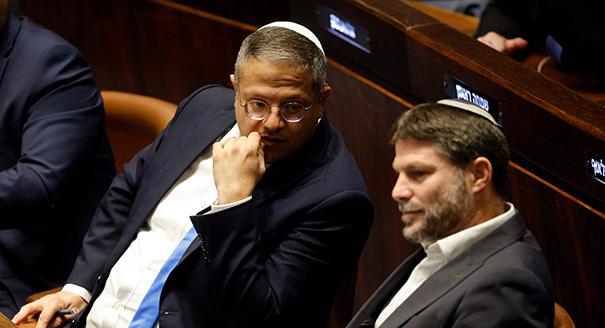Aaron David Miller is a senior fellow at the Carnegie Endowment for International Peace and a former negotiator and advisor to Republican and Democratic secretaries of state, where he helped formulate U.S. policy on the Middle East and Arab-Israel peace. Diwan interviewed Miller early in January to get his perspective on the new Israeli government of Benjamin Netanyahu, which includes several extremist ministers.
Michael Young: On January 3, Israeli Minister of National Security Itamar Ben-Gvir visited the Al-Aqsa Mosque compound, in a move that the Palestinians, as well as Saudi Arabia and the United Arab Emirates, described as a provocation. Where do you believe such steps by extremist Israeli ministers might lead?
Aaron David Miller: Israeli politicians and ministers have gone to the Haram al-Sharif-Temple Mount complex before in highly orchestrated visits. However, this visit reflected a different reality. It wasn’t a one-off, but an indication that Ben-Gvir, as the new national security minister, is determined to alter the status quo there, which has been eroding for years, and to make this permanent, institutionalizing Jewish prayer and presence. Indeed, despite Prime Minister Benjamin Netanyahu’s assertions that there will be no change in the status quo in the Haram al-Sharif-Temple Mount complex, the new government’s position is that Israel’s claims to the land of Israel are exclusive and unquestioned, including Jerusalem. It’s not clear at this point how committed Netanyahu is to holding the line. He was silent on the visit at a subsequent cabinet meeting. Left unchecked, Ben-Gvir has the capacity to start a thousand fires in and around Jerusalem and the West Bank.
MY: How much of a restraining influence do Arab countries such as Saudi Arabia and the UAE have on the actions of the current Israeli government? Do you believe the Saudis can afford to open diplomatic relations with such a government?
ADM: Netanyahu fashions himself as the architect of the Abraham Accords and will go to considerable lengths to preserve them, partly because it validates his conception that Israel can make peace with Arab states without the Palestinians. Much of the reaction of Arab states will depend on just how extreme the policies of the new government are toward the Palestinians, and on Jerusalem in particular, and whether or not Netanyahu can control his ministers. He very much aspires to be the first Israeli prime minister to meet publicly with a Saudi king or crown prince. But he also knows that the pace of normalization with Saudi Arabia will depend on a significant improvement in the U.S.-Saudi relationship, and may well have to await the accession of Crown Prince Mohammed bin Salman to the throne. Bottom line, it is not the Arabs who have real influence and leverage with Netanyahu, as much as it is the extremist ministers in his own cabinet who hold the key to the postponement or nullification of the prime minister’s trial on corruption charges. Right now, Netanyahu needs them more than he needs the Arabs.
MY: Many observers have viewed the current Israeli government as a watershed for Israel, one in which extremists have effectively taken over the main levers of power in the state. Do you agree with this, and what does it mean in particular for Arab-Jewish coexistence within Israel’s 1948 borders?
ADM: Israel has had right-wing governments before, but none has been this extreme, with a prime minister so beholden to the extremists. It’s unwise to make predictions this early in the government’s tenure and to draw hard and fast conclusions about whether this government is a headline or a trend line. In 1988, Likud had a coalition of 65 seats, but within four years the Labor politician Yitzhak Rabin had become prime minister. It’s clearly not the 1990s any longer. And Israel has clearly been on a rightwing pathway for decades. But the polling suggests that a large part of the electorate is not happy with this current coalition, as it was not happy with the Bennett-Lapid governments. The most hopeful prediction one might make is that any course correction would bring Israel back to a rightwing or center-right government without the fundamentalists.
As for the relations between Israel’s Arab and Jewish citizens, it’s really quite extraordinary that in the wake of some of the worst communal violence since the state of Israel was created, in May 2021, you had an Arab party, Mansour Abbas’ United Arab List, formally join an Israeli government. And in the recent Israeli elections, Jewish fundamentalist parties demonized Palestinian citizens of Israel to secure more votes. Indeed, the prospects for increased tension and violence between Israeli Jews and Palestinian citizens of Israel has increased substantially, particularly in mixed cities.
MY: If the two-state solution is dead, and if Israel regards a one-state solution as an existential threat to the Jewish nature of the state, are we heading in the direction of a mass expulsion of the Arab population between the Jordan River and the Mediterranean? In other words, if both separation and integration are impossible, what alternatives are left to Israel when it comes to Arabs under its control?
ADM: What we can say is that the two-state solution seems to be going the way of the dodo; and a one-state outcome, where everyone lives happily ever after, is a fantasy. What you have now is a semi-independent Gaza controlled by Hamas; a Palestinian Authority dependent on Israel partly in charge of 40 percent of the West Bank, with Israel occupying the remaining 60 percent. This reality is marked by periods of accommodation and confrontation between and among the parties involved. And the new government will likely do its utmost to bind that 60 percent of the West Bank and Jerusalem to Israel in any way it can.
Beyond that and the prospect of more confrontation and violence, it’s impossible to say what the future holds. Not even the famed Oracle at Delphi, reading the best goat entrails, could answer that question.






